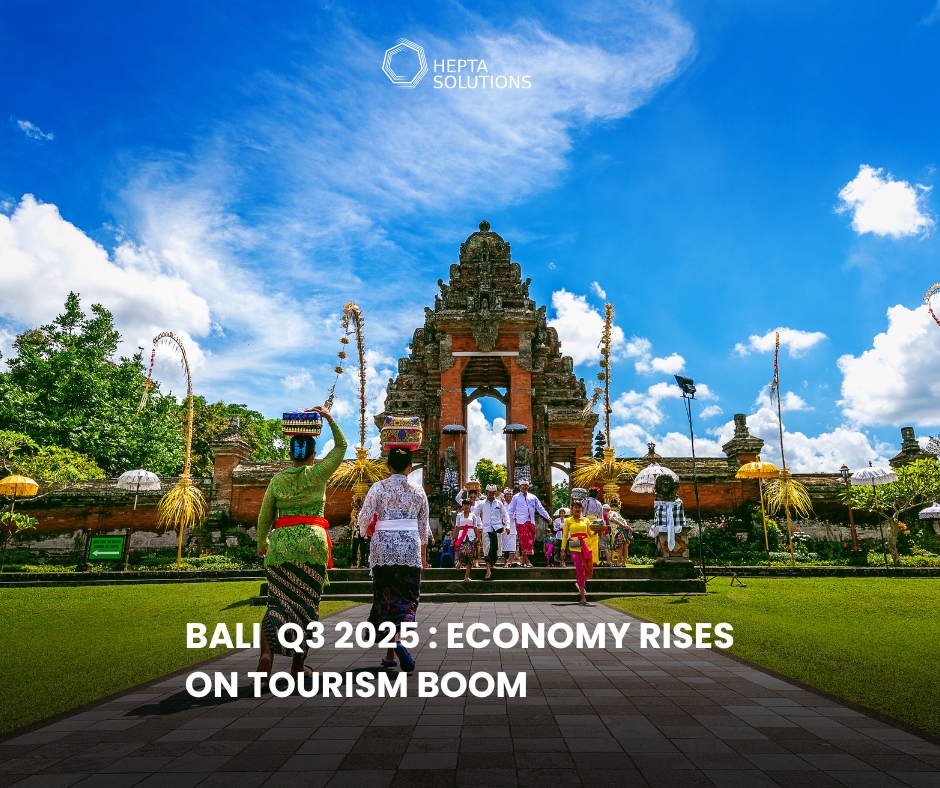
Bali Economy Report Q3 2025
Executive Summary
Bali’s economy kept its strong momentum in the third quarter of 2025. Growth was fueled by record-breaking tourism arrivals, robust real estate activity, and rising investment confidence. At the same time, new government regulations focused on sustainability and business transparency are reshaping the island’s development path.
Key highlights:
- Tourism: Daily foreign arrivals averaged 17,000–18,000 by August, keeping Bali on track to reach its 6.5M target for 2025.
- Real Estate: Demand for villas and co-living spaces stayed high, but a moratorium on building on farmland signals a stricter stance on sustainability.
- Agriculture: Farmers continue to face rising input costs despite steady rice yields.
- Recycling & Sustainability: Plastic bans and EV adoption are advancing, but Bali still recycles less than 10% of its waste.
- Investment Climate: Business licensing has been streamlined, and Indonesia’s Golden Visa is attracting more serious investors.
Tourism and Hospitality
International arrivals rose steadily through Q3. By August, Bali welcomed 17,000–18,000 foreign visitors per day according to industry officials (source). Domestic tourism was also strong, with 10.5 million Indonesian visitors projected for 2025.
To protect Bali’s culture and environment, the governor issued Circular Letter No. 7 of 2025. It introduced a tourist levy of IDR 150,000 (US$10) payable through the official Love Bali platform. Tourists must also respect local customs, dress modestly at temples, use licensed transport, and avoid single-use plastics (full guidelines).
In September, the Indonesian government launched the All Indonesia mobile app for customs, immigration, and health declarations. Travelers to Bali must now complete the form up to three days before departure (source). This move has reduced airport queues and improved the visitor experience.
Real Estate and Development
Bali’s property market remained active in Q3. Villas and long-term rentals in Canggu, Seminyak, and Ubud continue to see strong demand, while Sanur and northwest Bali are emerging as new hotspots (source).
Infrastructure development is also shaping the market:
- North Bali Airport remains in planning stages but is still a strategic priority.
- The Gilimanuk–Mengwi toll road is progressing and will improve logistics and tourism flow.
- Electric vehicle charging stations are expanding in line with Bali’s green economy push.
In response to devastating floods in early September that caused fatalities and major damage (source), the governor announced a moratorium on new hotel and villa projects built on farmland. Permits to convert rice fields into commercial use are frozen, and spatial planning reviews are underway to integrate stricter zoning and green open spaces. For investors, this signals that eco-friendly projects aligned with sustainability standards will be prioritized.
Agriculture
The Farmer Terms of Trade Index (NTUP) averaged 108.5 in Q3, down from 109.1 in Q2. Rising costs for fertilizer, labor, and transport remain a challenge (source).
While rice production stayed stable, global coffee and cocoa price fluctuations constrained export revenues. Climate variability has also caused uneven yields. In response, local cooperatives are promoting permaculture and regenerative farming, while some pilot projects are exploring agroforestry and organic certification to boost value.
Recycling and Waste Management
Bali reinforced its commitment to sustainability in Q3. The ban on single-use plastic bottles under 1 liter, enforced in April 2025, continued to roll out across hotels, restaurants, and tourist sites (source).
Adoption of refill stations and biodegradable packaging is growing, but recycling rates remain below 10%. Meanwhile, Bali’s government and NGOs are working on waste-to-energy, composting, and reverse logistics projects. These present opportunities for eco-focused ventures and investors.
Investment and Business Climate
Bali’s investment inflows doubled year-on-year in the first half of 2025. Most capital went into tourism, real estate, and the creative economy (Bank Indonesia Bali).
Regulatory updates include:
- Government Regulation No. 28 of 2025 simplified business licensing with faster timelines and “fictitious positive” approvals if agencies miss deadlines.
- Indonesia’s Golden Visa program offers 5- to 10-year stays for investors meeting minimum thresholds (US$350,000 in equities or US$2.5 million for company establishment).
Authorities also raised the minimum capital for foreign-owned PT PMA companies to IDR 10 billion per shareholder to curb abuse of investor visas. This ensures Bali attracts only serious, well-capitalized investors.
Policy and Regulatory Developments
Several local initiatives emerged in Q3:
- A draft Regional Regulation on Ride-Hailing is being discussed to integrate app-based transport with quality and safety standards.
- Bali continues to push its clean energy agenda, expanding EV adoption and solar power use.
- Enforcement of the ban on single-use plastics remains strict, supported by cleanup drives after the September floods.
These moves highlight Bali’s intent to balance growth with governance and sustainability.
Outlook
Bali is expected to maintain above 5% economic growth through the end of 2025 (Bank Indonesia Bali). Tourism will continue driving momentum, supported by holiday travel, visa reforms, and infrastructure projects.
Risks remain, including global economic uncertainty, climate change impacts, and regulatory tightening. However, with stronger governance and proactive policies, Bali remains one of Indonesia’s most promising investment destinations.
Final Remarks
Bali enters Q4 2025 with strong economic fundamentals, a booming tourism sector, and improving regulatory frameworks. For investors, business owners, and entrepreneurs, the island offers compelling opportunities — provided strategies align with sustainability and compliance.
Partner with Hepta Solutions
The Bali economy is evolving quickly, and success depends on the right insights and strategies. At Hepta Solutions, we help investors, business owners, and entrepreneurs navigate Bali’s regulations, identify profitable opportunities, and build sustainable ventures.
Contact us to learn how our team can support your next move in Bali. Let’s turn opportunities into results.
